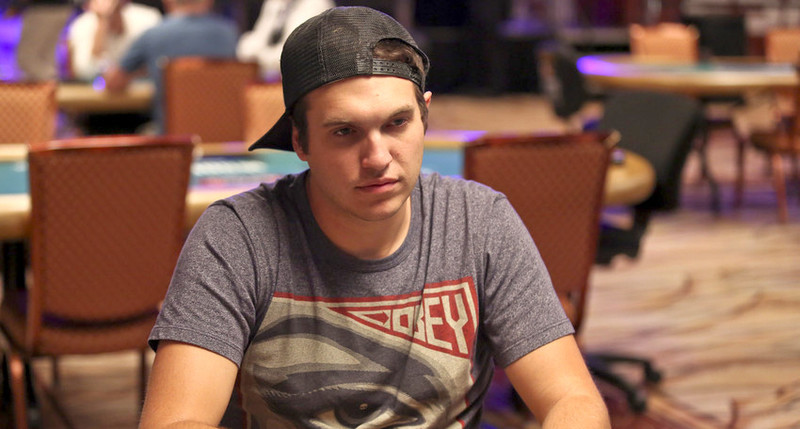






Poker Strategy With Doug Polk: Optimizing Your Mindset For Poker SuccessSign Up For The Upswing Poker Lab Today To Increase Skill And Earnings |
|
|

The Upswing Poker Lab is a poker training course taught by Doug Polk and Ryan Fee. The Lab is updated regularly with in-depth learning modules, theory videos, and a wealth of information to make you a better poker player.
Achieving success in poker requires an exceptionally objective mindset. You must evaluate decisions rationally, be self-critical, and receptive to new ideas. Being able to assess and develop your own poker game in this way translates to confident decision-making; confidence itself being a key component of a strong poker mindset.
In this article, we’ll discuss how these components make for a strong poker mindset. Along the way, we’ll also look at two common mindset pitfalls, and discuss ways to address them.
1. Failing to Analyze Your Own Game Objectively
In poker, you simply cannot improve while being ignorant of your own mistakes—the first step to improving is identifying your leaks, and being receptive to new concepts. But many players are too confident in their game, which prevents them from taking this step. And, ironically, this is probably most true of already-winning players, who have good reasons to be confident. The trick is, then, to be just as diligent as you are confident.
As any professional poker player can tell you, there may come a time when you feel you’ve learned nearly everything you need to know, only to discover a new concept that revealed more depth and complexity in the game. Simply put, it is important to never feel like you’ve perfected your poker strategy. So long as no-limit games remain un-solved there will be room for improvement.
Tips For Developing an Objective Mentality
• Resist becoming prideful about your own game
If an opponent makes a play that you wouldn’t have made, pause to think about what she did. You might conclude that her play was sub-optimal, or even flatly wrong, but you will have arrived at that conclusion by thinking rationally about it. Or, maybe you’ll discover her play was, in fact, better than what you would have done, in which case you’ve learned something new.
• View tough competition as a learning experience
Similarly, rather than viewing your strongest opponents as enemies, view them as players who you can learn from. Adjusting your mentality in this way will help you to notice and adopt strategies that your opponents have shown to be effective.
Remember: Poker is a complex game. Different lines can be effective, and to varying degrees in different situations. Only by keeping an open mind will you be able to evaluate the many decisions you can make towards developing a strong overall strategy.
2. Lacking Confidence in Your Game
While being self-critical is key for becoming a great poker player, you must also be confident in your decision making.
Tips for Becoming More Confident In Your Decisions
• Learn to accept that you will not win every pot.
Some of your bluffs will get snapped off by hero calls, and there will be times when your hero-calls run into the nuts. But that’s poker—variance is a facet of the game. Learn to accept that fact and you’ll be able to maintain confidence through the ups and downs.
• Reassure yourself regularly
Continually reassure yourself that so long as you are assessing your own strategy objectively you can be sure of your decisions. This will help you to build and maintain confidence about your plays, even when they don’t work out. For example, if you get called after making a bluff using the perfect blockers, and in a spot that favours your range, you can move on from the situation knowing that you made a well-thought-out decision irrespective of the outcome.
If you struggle with making ambitious but effective plays, find ways to reassure yourself of their effectiveness. Try to recall a time when you successfully overbet bluffed, for example—when you knew your opponent would have to fold or make a razor-thin call.
Thinking About the Poker Dream
Every aspiring poker player dreams of ‘making it’—climbing up in stakes, reaching the top and raking in the cash. It’s good to have aspirations. They keep you motivated, so you can put in the work necessary to make the dream happen.
However, there is so much more to becoming a great poker player than making lots of money. Think of things this way: winnings are merely a result of playing great poker.
Difficult though it may be, you need to think big-picture to become a great player, which means learning to forget about the dream (the money), and becoming dedicated to strategy.
To sum up, you should strive for a mindset tailored for poker success. Towards that end, a few key components of that mindset are:
• Think objectively about your game and your opponents’ games.
• Build and maintain confidence in your decisions as a result of that thinking.
• Focus on strategy, not monetary results, to become a great poker player. ♠
Sign up for the Upswing Poker Lab today for step-by-step instructions and examples to master both the fundamental theories and situational exploits to greatly increase your skill and earnings.
